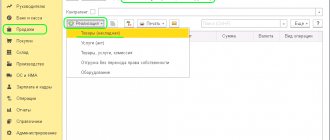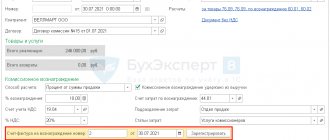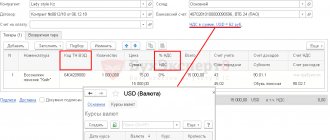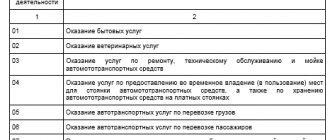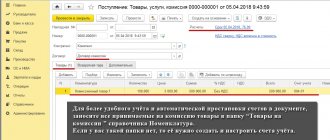As is known, a special UTII tax regime can be applied in retail trade, subject to certain conditions. But the sale of goods can be carried out not only directly on the sales floor - there is also trade in catalogs and the sale of things based on samples. How to be in this case? Is it possible to sell goods based on samples and trade using UTII catalogs?
ATTENTION! Starting with reporting for the fourth quarter of 2022, a new tax return form for the single tax on imputed income will be used, approved by Order of the Federal Tax Service of Russia dated June 26, 2018 N ММВ-7-3/ [email protected] You can generate a UTII declaration without errors through this service , which has a free trial period.
Under what conditions can retailers apply UTII?
According to the instructions of paragraphs. 6 paragraph 2 art. 346.26 of the Tax Code of the Russian Federation, representatives of retail trade receive the right to apply the special tax regime UTII (Unified Tax on Imputed Income) provided that the area of the sales area of the store or pavilion in which visitors are served does not exceed 150 sq.m. Let's understand some concepts to make things clearer:
- Article 346.27 of the Tax Code of the Russian Federation defines the concept of retail trade
in relation to the situation with the transition to UTII. Retail trade is a type of business activity, the essence of which is the sale of goods under a retail purchase and sale agreement, incl. using payment cards and in cash. - The same article of the Tax Code contains a definition of a stationary retail chain
. This is considered a building or other structure specially adapted for trading (kiosks, pavilions, shops). - The area of a sales floor
is a part of a premises intended for trade (pavilion, store) or an open area where goods are sold, occupied by equipment used for demonstrating and displaying goods, as well as servicing and making payments (cash, non-cash) with customers. Areas are also taken into account:
- aisles for shoppers;
- cash registers;
- cash registers;
- service personnel workplaces;
- rented portion of the retail space.
Important!
If the owner of a retail chain operates several stores (pavilions, kiosks), it is not their total area that is taken into account, but the retail area of each retail outlet separately. The area of the sales area of each trade facility should not exceed 150 sq.m.
Any area of the store where customer service is not provided is not a sales area.
Warehouses from which goods arrive at the store or are directly issued to the buyer should not be taken into account. Also not taken into account are the areas of premises for receiving, storing and pre-sale preparation of goods, staff premises, utility and administrative premises.
Trade by samples - an “imputed” activity?
Currently, many companies are introducing online sales, when goods are ordered by phone or online and delivered to the specified address. However, not always in this case the company will be able to remain a UTII payer. Let's consider the nuances, taking into account the opinions of officials. This will help determine under which tax regime to report for the second quarter.
When “imputed” activity does not occur
In accordance with subparagraph 6 of paragraph 2 of Article 346.26 of the Tax Code of the Russian Federation, the regime in the form of payment of UTII is applied to activities in the field of retail trade carried out through stores and pavilions with a sales area of no more than 150 square meters. m for each trade organization object. According to Article 346.27 of the Tax Code of the Russian Federation, retail trade refers to activities related to the trade of goods (including in cash, as well as using payment cards) on the basis of retail sales contracts. But please note: this type of activity does not include the sale of goods based on samples and catalogs outside a stationary retail network, including in the form of postal items (parcel trade), as well as through teleshopping, telephone communications and computer networks. On this basis, trade in which the contract is concluded in the office and the goods are delivered to the buyer’s home is not transferred to the payment of UTII. This is precisely the opinion expressed in the letter of the Ministry of Finance of Russia dated June 10, 2010 No. 03-11-06/3/80.
When can UTII be paid?
At the same time, there is an important clarification in the definition of trade based on samples and catalogs: such sales are not considered retail only if sales are carried out outside a stationary retail chain. Therefore, we need to find out what applies to a stationary retail network (when we can legally pay UTII). And this is a trading network located in buildings, structures, structures intended or used for trading, connected to utilities. For example, shops are classified as objects of a stationary retail chain. In a letter dated February 22, 2012 No. 03-11-06/3/12, the Ministry of Finance of Russia expressed the point of view that if the sale of goods according to samples and catalogs is carried out through a trade facility, which, according to inventory and title documents, is a stationary trade facility network, then such activity can be recognized as retail. And accordingly, you can pay a single tax on imputed income. Although in a letter dated December 31, 2010 No. 03-11-06/3/175, specialists from the financial department in a similar situation made a different decision. It is possible that their position has now been influenced by the established arbitration practice: judges take the side of taxpayers when considering disputes on this topic. As an example, we can cite the resolution of the Federal Antimonopoly Service of the Volga Region dated May 12, 2010 No. A57-10706/2009. In this regard, there is an option to avoid claims from tax authorities when trading via the Internet. Provided, of course, that the area of the store's sales area is less than 150 square meters. m. The trick is that the buyer can choose and order goods via the Internet, but for the goods themselves he will have to come to the store and pay for it in cash or using a card. And the seller will issue him a sales receipt or cash receipt (other document).
>|UTII payers may not use CCP for cash payments with buyers, provided that they are issued with another document confirming the receipt of money.|< In this case, financiers find no reason to refuse the seller to use UTII (letter from the Ministry of Finance of Russia dated January 24, 2011 No. 03-11-11/11).
Consider the area of the object
Special attention should be paid to trade in such specific products as building materials. After all, many types of building materials are not easy to place indoors - sand, crushed stone, brick, timber, and a host of other similar products. Therefore, most often they are placed outdoors - under a canopy, or even just in the open air. Thus, the buyer first pays for the goods and then picks them up from the warehouse. Could this be an obstacle to the use of UTII? Will this be considered trading by design? Let us recall that the place used for carrying out retail purchase and sale transactions is defined as a trading place. Retail locations include buildings, structures, structures and land plots used for retail purchase and sale transactions. The store belongs to the objects of a stationary retail chain that has trading floors. At the same time, the area of the sales floor includes, among other things, the part of the store, pavilion (open area) occupied by equipment intended for displaying, demonstrating goods, conducting cash payments and servicing customers. But the area of utility, administrative and amenity premises, as well as premises for receiving, storing goods and preparing them for sale, in which customer service is not provided, is not the area of the sales floor.
>|The area of the sales floor is determined on the basis of inventory and title documents.|< The Russian Ministry of Finance decided that in order to determine the possibility of applying UTII, the trading area of the store where small-sized goods are sold and the area of the land plot on which this product is located should be combined (letters from July 20, 2010 No. 03-11-11/203, dated November 1, 2006 No. 03-11-04/3/481). And if the retail area of the store and the area of the land used for sales are less than 150 square meters. m, you need to pay UTII. So you need to be very careful: even if the controllers do not insist that trade is based on samples, you can lose the right to use “imputation” due to the large trading area. Important to remember
If trade using samples and catalogs is carried out through fixed-line network facilities, the organization has a chance to remain a UTII payer (subject to other conditions for applying this special regime).
The article was published in the journal “Accounting in Trade” No. 7, July 2012.
Hello Guest! Offer from "Clerk"
Online professional retraining “Chief accountant on the simplified tax system” with a diploma for 250 academic hours . Learn everything new to avoid mistakes. Online training for 2 months, the stream starts on March 1.
Sign up
In what cases should UTII not be used?
Whatever commercial premises the taxpayer uses in his activities, he must have the title and inventory documents drawn up for this facility.
The mentioned papers should reflect the following information:
- Proving the legality of using the outlet. Such information is written down in the following documents: contract of purchase and sale of non-residential premises, plans, explications, diagrams, technical passport, lease (sublease) agreement for the entire retail outlet or only part of it, permission to serve visitors on an open trading floor.
- About the layout, design features, purpose of the object.
In this case, the type of outlet does not matter - it can be a stationary store, a pavilion, a kiosk, a stall, a tent at a fair, a hand cart, a tray, a sales trailer, a point in a shopping center, or a vending machine.
Accordingly, if the entrepreneur does not have the listed documents, it is not possible to determine the status of the premises, and the UTII tax regime cannot be applied.
It will also not be possible to switch to UTII if the area of the retail facility exceeds 150 sq.m. That is, if an entrepreneur maintains a single pavilion with an area of 170 sq.m., UTII cannot be applied. If a businessman owns five kiosks of 90 sq.m. Everyone - UTII is affordable for him.
New responsibilities for sellers
Among them:
- Sending a response to the client regarding any stated claims (clause 5 of the Rules).
The Rules do not indicate within what time the seller is obliged to respond to such claims. It is legitimate to talk about the relevance of the deadlines determined by analogy in accordance with Art. 20, 21, 22, 25 and 26.1 of the Law “On the Protection of Consumer Rights” dated 01/07/1992 No. 2300-1. You can also focus on the seven-day period provided for in Art. 314 Civil Code of the Russian Federation.
- Providing, at the buyer’s request, a sales receipt to accompany the cash receipt, if the second does not reflect the individualizing characteristics of the goods (name, article, model) in relation to:
- goods that are technically complex;
- animals, plants;
- building materials, products;
- fabrics, clothing, fur products, shoes;
- furniture.
At the same time, the norm in question essentially contains a preference for the seller: if the cash register receipt contains the corresponding individualizing features for the product, then in this case it is not necessary to issue a sales receipt in principle. Jewelry sellers, in accordance with the new trade rules, as we noted above, have the right not to issue sales receipts in any cases.
- When carrying out trade using vending machines - bringing to the attention of the buyer information disclosing:
- information about the seller (name of the business entity, OGRN or OGRNIP, address, operating hours, contact details);
- disclosing the rules for using a vending machine for the purpose of concluding a purchase and sale agreement;
- the procedure for returning money paid for a product if the device did not issue it to the consumer.
You can also highlight the potential new obligation of the seller, which may arise on the basis of the rule under clause 23 of the new trade rules. It says that the costs of returning goods of inadequate quality are borne by the seller, and in other cases (that is, when returning goods of proper quality), the distribution of costs is determined by the offer. In it, therefore, the seller, at his discretion, can “prescribe” himself the obligation to bear the corresponding expenses. Again, this may be due to consumer loyalty policies.
Certain innovations have been adopted in relation to online stores: now we will talk about the standards applied to a specific retail industry.
Expert opinion on the question of whether trading using UTII catalogs is possible
Summarizing all of the above, we can conclude that trade in catalogs can be taxed under a special UTII regime, provided that 2 requirements are met:
- The area of each sales area individually does not exceed 150 sq.m.
- The main part of the trading service is provided on the territory of the trading floor (trading according to UTII catalogs is carried out through specialized stores with subsequent delivery of the goods).
If sales based on samples and catalogs are carried out “outside the stationary network”, without the need to visit the sales floor, then the use of UTII is unacceptable.
Example 1: Retail sale of modular kitchens
A store selling modular kitchens has opened; it operates according to the following principle:
- The client comes to the store and looks at samples of kitchens available for production.
- The buyer places an order at the counter located in the hall.
- The modular kitchen is shipped from the warehouse and delivered to the buyer personally or delivered to the home.
Since the client chooses a product in a store (on the sales floor), where kitchen samples are presented, after which he signs a retail sales contract and pays for the purchased furniture, we can say that the seller provides the main part of the trading service in the store. Accordingly, there are no obstacles to the application of the UTII tax regime.
Example 2. Sale of furniture based on samples outside a stationary retail chain
The store sells prefabricated furniture based on samples. Product samples are located in the entrance building (this room is located in the service area, according to the technical plan). Buyers select a sample, place an order, pay for the goods, after which the furniture is delivered to their home.
Since the sale of goods is carried out outside a stationary retail chain, not on the territory of the sales area, the entrepreneur does not have the right to switch to UTII.
When trade in samples does not allow the use of UTII
In the case under study, the taxpayer presented a registration certificate and a lease agreement, where the commercial premises were called a store. Therefore, the arbitration recognized the legality of the imputation. If there are no such documents, the court will prohibit the special regime.
Example
According to the taxpayer, samples of the goods are in the store. The evidence is a sign at the entrance to the disputed premises (“StroyKa Store”), the position of the manager (“store manager”). Referring to this, the organization calculated UTII. But the status of the premises is determined by inventory and title documents. The rooms where product samples are located are located in the entrance building. The technical passport classifies it as a building for service purposes, and not as a stationary retail chain. Sales based on samples outside such a network are not transferred to UTII (Resolution of the Federal Antimonopoly Service of the North-Western District dated December 25, 2012 No. A05-2406/2012).
How to defend yourself at the commission for the legalization of taxable objects
I recognize individual trade in samples on UTII as illegal for other sales based on samples and catalogs outside the stationary distribution network. For example, when the samples are in the office (Resolution of the Presidium of the Supreme Arbitration Court of the Russian Federation dated February 28, 2012 No. 14139/11). Or in another administrative premises (resolution of the Federal Antimonopoly Service of the North-Western District dated June 26, 2012 No. A05-10626/2011). Or in a former workshop building (resolution of the North Caucasus District Administration of June 15, 2015 No. A32-21634/2014). Or in the exhibition hall (resolution of the Federal Antimonopoly Service of the Ural District dated June 29, 2012 No. F09-4404/12). Or in a warehouse (resolution of the Federal Antimonopoly Service of the East Siberian District dated April 18, 2013 No. A78-7424/2012). Or in a utility room at a parking lot (Resolution of the Federal Antimonopoly Service of the West Siberian District dated November 1, 2013 No. A45-25207/2012) or at a building materials database (Resolution of the Federal Antimonopoly Service of the North Caucasus District dated May 26, 2014 No. A53-649/2013). Or in a room that, according to documents, is classified as residential (resolution of the Federal Antimonopoly Service of the North Caucasus District dated December 10, 2012 No. A01-284/2012).
How to avoid tax losses from tightening trade laws
Common mistakes
Error:
An entrepreneur who sells goods through a catalog outside a retail chain submits documents to transfer the business to UTII.
A comment:
If the product is sold outside the territory of a stationary retail chain, the transition to UTII is impossible.
Error:
A businessman owns a network of kiosks selling goods based on samples. He is not making the transition to UTII, since the total area of his stalls is 300 sq.m.
A comment:
The transition to UTII is possible, since the area of each stationary facility is taken into account separately - it should not exceed 150 sq.m.
How to register as a trade tax payer
It is assumed that the TS payer must register on his own by submitting a special notification in form No. TS-1 within five working days from the start of trading. To do this, you need to contact the Federal Tax Service at the place of business. LLCs and individual entrepreneurs that are engaged in distribution or distribution trade in the capital must submit a notification to the Federal Tax Service at the place of their registration.
Confirmation of the registration of the fee payer will be a certificate sent by the tax office within five working days. If the retail outlet does not register voluntarily, this will still happen, but forcibly. We have already noted above that in this case, the vehicle payer loses the right to reduce the tax on the costs of paying the fee.
The Department of Economic Policy and Development is responsible for how the trade tax is collected in Moscow in 2022. The agency identifies trade establishments that have not submitted a notification and transmits this data to the Federal Tax Service. For this, the LLC or entrepreneur will be fined under Article 116 of the Tax Code of the Russian Federation in the amount of 10% of the amount of income received, but not less than 40,000 rubles.
Answers to common questions about whether trading using UTII catalogs is possible
Question #1:
I have a business selling goods through catalogs. There are small retail outlets throughout the city where visitors are provided with catalogs from where they can choose the product they like, which will be delivered to their home. Payment is made within the boundaries of retail outlets. Is it possible to switch to UTII?
Answer:
Since the main part of the trading service is provided to the buyer within a stationary trading network, the transition to UTII is possible. In your case, trading using UTII catalogs is possible.
Question #2:
I have a store with an area of 130 sq.m. with samples of goods and a warehouse where most of them are stored. Is it possible to switch to UTII?
Answer:
Yes, you have the right to apply UTII, because The area of office premises, which includes a warehouse, is not taken into account when calculating the area of retail space.
Responsibility for violation of retail trade rules
The rules in question, as we already know, replaced several regulations at once - regulating legal relations in various areas of retail. The application of penalties under the Code of Administrative Offenses during periods when these regulations were in force depended on the essence of the violation of the rule provided for by a certain source of regulations.
Therefore, it is difficult to identify any universal article of the Code, or at least several of them, that will be subject to application in the event of one or another violation of the rules under Resolution No. 2463 - due to the fact that it regulates legal relations in various areas of retail, in which rights and Sellers' responsibilities may vary. But the provisions that are most likely to be applied for punitive purposes are:
- Art. 14.15 Code of Administrative Offenses of the Russian Federation (in case of violation of the rules for the sale of certain types of goods) - LINK.
Fine amount: up to 500 rubles for citizens, up to 3,000 rubles for officials (and individual entrepreneurs), up to 30,000 rubles for legal entities.
As judicial practice shows, the article in question of the Code of Administrative Offenses of the Russian Federation is also applied in cases of violation represented by failure to provide complete information to the buyer about the product. Such a violation, as follows from a number of the above-mentioned norms under Resolution No. 2463 - for example, those requiring the addition of a sales receipt to a cash receipt, can be regularly recorded by inspection authorities.
- Art. 14.8 Code of Administrative Offenses of the Russian Federation (violation of the consumer’s right to receive information about a product, manufacturer, seller) - LINK.
This is a “softer” article - with a fine for officials of up to 1,000 rubles, for legal entities - up to 10,000 rubles. It is used, as a rule, in case of minor violations in terms of informing customers (for example, in the absence of uniformly designed price tags, information about the store address at the entrance to it - LINK). At the same time, the article is potentially applicable in all cases where there are no clear grounds to fine Art. 14.5 of the Code, but there are formal signs of violations.
As, of course, in cases where information about a product can be especially valuable for the consumer. First of all, during distance selling, when the purchase decision is made primarily on the basis of available information, since it is impossible to touch and try on the product. In accordance with Resolution No. 2463, the seller is obliged to publish such information very carefully.

